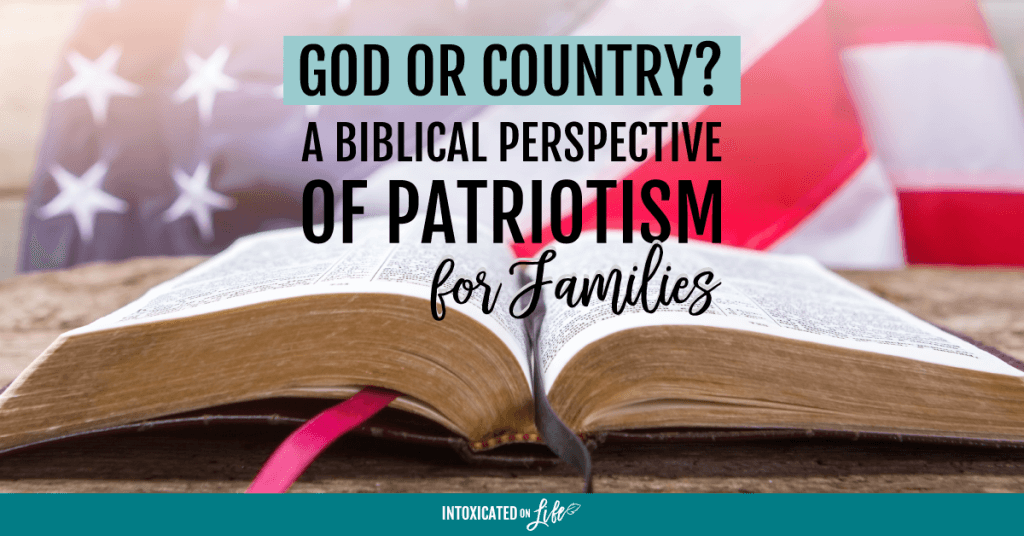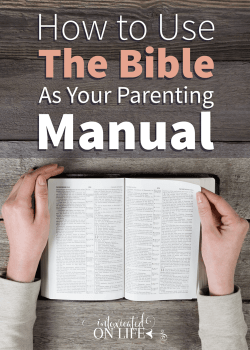The summer is fast approaching, and with it we can expect backyard barbecues, swimming pools, and multiple holidays honoring our country. Our nation’s birthday is smack dab in the middle of summer, after all; is it any wonder summer feels like the most patriotic season?
Merriam-Webster defines patriotism as “love for or devotion to one’s country.” Seems simple enough, right? But it’s not always easy to know what this looks like in practical, everyday life.

How can we display patriotism when we’re less than happy with what’s happening in our government? When leaders dissatisfy us? When fellow countrymen disappoint us? When politics disheartens us?
4 Biblical Principles on Patriotism
Thankfully, God has given us much helpful wisdom on this topic in His Word. Here are some biblical principles to instill in our kids on the subject of patriotism:
1.Teach our true citizenship
According to Philippians 3:20, our citizenship is in heaven.
Have you ever felt like you don’t quite belong in this country you love? Things aren’t as they should be, and that in some way, shape, or form, they never will be? With every change in leadership, we simply trade one set of problems for another? These feelings are confirmation of the truth that as a Christian you are first and foremost a citizen of heaven.
Our true citizenship is in heaven, and God Himself is our ultimate leader, the King over all earthly authority (Revelation 19:16). This means our first allegiance is to God, and we must be cautious about elevating any other leader too high in our esteem or our fidelity.
2.Pray for our nation and its leaders.
Paul writes:
First of all, then, I urge that petitions, prayers, intercessions, and thanksgiving be offered on behalf of all men for kings and all those in authority, so that we may lead tranquil and quiet lives in all godliness and dignity. (I Timothy 2:1-2)
Many Christians are familiar with this command, but far too few of us are faithful to obey it, much less make it part of our regular family worship.
Praying for our nation can include prayers for revival, for strengthening of families, for protection from evil, and for God’s will to be done in our land. Praying for our President and other elected officials might include prayers for salvation, spiritual growth, wisdom, and humility.
3.Keep our love for America God-centered.
It’s good to love our nation, but it’s important to keep at the forefront of our patriotism the awareness that anything great about America comes from God alone. We should thank Him for our freedoms, recognizing:
- We are not blessed because of our righteousness or inherent goodness.
- America is simply a nation God has chosen to bless because that’s what brings Him glory in this particular era in time.
- American Christians are responsible to steward their blessings well, investing them for eternal purposes and not merely our own pleasure.
4.Train in civic responsibilities
Our freedoms are gifts from God, and He grants them with the expectation for us to manage them well. With great privilege comes great responsibility (Luke 12:48). Some of these civic responsibilities include:
- obeying the laws
- appreciating civil servants
- serving the community
- voting
- paying taxes
- honoring our veterans
- participating in local government
- being informed of issues in government
Framing patriotism in the context of our Christian faith will help us train the next generation of informed citizens whose love of America is well-balanced with their love for God.
It’s your turn now! How do you develop a healthy, God-honoring sense of patriotism in your kids?











My adult son and I were discussing the validity of pledging allegiance to the flag when our primary allegiance is to God. He sees it as contradictory. Your thoughts?
Hi, Kim, and thanks for your very thoughtful question. Quite honestly, this is an idea I myself have been grappling with recently, and the short answer is that I haven’t yet reached a conclusion. The heart of my own struggle is this question: Can I solemnly promise my faithful commitment to a nation when I can’t foresee how that pledge might someday interfere with my vastly superior covenant with God Almighty? Ultimately, I believe this is a matter of conscience, and that earnest Christ-followers may come down on both sides of this issue. I welcome any follow-up thoughts you’d like to share.